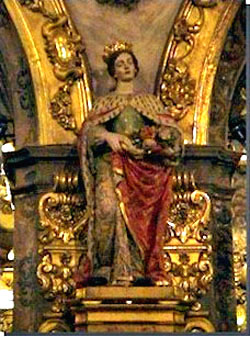 |
The Saint of the Day
St. Elizabeth of Portugal - July 8
Prof. Plinio Corrêa de Oliveira
Biographical selection:
Elizabeth was born in Zaragossa, Spain, in 1271, the daughter of King Pedro III of Aragon, and Constantia, daughter of King Manfred of Sicily. She received her name in honor of her great-aunt St. Elizabeth of Hungary, who had been canonized in 1235. Both Saints are known in Spain as Isabella and in Portugal as Isabel. Her providential birth reconciled the bitter quarrel between her grandfather, James, and her father that had divided the kingdom.

St. Elizabeth of Portugal
|
At age 12, she was married to King Denis, or Diniz, of Portugal, who admired her character and birth and left her free to practice her austerities, devotions and charities for the poor, but he did not imitate her virtues. His personal life was sinful, which caused St. Elizabeth to suffer greatly and gave scandal to the people.
Elizabeth had two children with King Denis: Alfonso, who later succeeded his father, and a daughter, Constantia. As Alfonso grew, he showed a rebellious spirit, in part due to the favors his father bestowed on his illegitimate sons. Twice he rose in arms against family members – the first time against his father, and the second, against his son-in-law. Twice his mother secured peace between the disputing relatives.
Widowed in 1325, Elizabeth entered the Third Franciscan Order in the Poor Clares Convent she had founded in Coimbra, living in a house near it. Thenceforth she dedicated herself completely to the poor and the sick. In one of the chapels she built in Coimbra, the public devotion of the Immaculate Conception was celebrated for the first time.
After contracting a strong fever, her health declined and she died in peace on July 4, 1336, after receiving a vision of Our Lady. In 1516, her public devotion was authorized in the Diocese of Coimbra, and her solemn canonization took place in 1625.
Comments of Prof. Plinio:
In the life of St. Elizabeth of Portugal, there are aspects that allow us to draw a parallel between the true Catholic meaning of her life, reported in this selection, and how Progressivism would present one of its saints.

A statue of the Queen-Saint in Zaragossa
|
It is interesting how her married life is the opposite of what Progressivism would like to report on one of its “saints.” Indeed, the selection tells us that she married King Denis very young and had much to suffer from him. We know from History that her patient sufferings earned his conversion at the end of his life. Progressivism, however, would like to present her in another way: “She was married to a brutal husband but firmly demanded her woman’s rights and emancipation, and finally conquered him.” This would be how Progressivism would like to depict her marriage.
Instead of saying that she had an enormous charity for the poor, Progressivism would portray it differently: “She fought for those marginalized by an oppressive feudalism. She had a spirit ahead of her times, with sympathies, perhaps even unknown alliances, with that wing of the Franciscans who were, so to speak, pioneers of Socialism and Communism; she was always striving to attain the needed social reforms to liberate the poor.”
Instead of praising her austerity (Progressivism hates austerity), what Progressivism would like to say is that she was known for her joy of life and attracted people by her contagious cheerfulness.
Instead of saying that she promoted peace among the members of her royal family, Progressivism would present her as a pacifist, asserting that she was “dedicated to the ideal of a universal republic, promoting peace wherever she could.”

A statue of St. Elizabeth in Coimbra; behind her, the coffin holding her incorrupt body
|
Instead of saying that after becoming a widow, she wanted to serve God alone, Progressivism would like to pretend that she was seeking another husband and to emphasize the natural beauty she still possessed.
Progressivism would label as “a fanatic” the Catholic who possibly gave her the wise counsel that led her to abandon the world and enter the Third Order of St. Francis. Once she had taken this step, it might pretend that she was not comfortable with the use of the habit, insinuating that she would like to see it abolished.
Instead of emphasizing her complete dedication to the poor and sick, Progressivism would like to imply that she joined a kind of Workers’ Movement where she learned the most updated techniques to deal with the handicapped.
Instead of praising her for building small pious chapels in Coimbra with only a few places for statues, Progressivism would say that, anticipating the reforms of Vatican II, she built chapels with almost no statues.
This is how Progressivism would like to present her life.
By the way, there is a very beautiful and charming story in her life that is not reported in this selection. It is an episode similar to the one that took place with her great-aunt, St. Elizabeth of Hungary.
Once, St. Elizabeth of Portugal was going out to distribute money to the poor with the frontal piece of her dress, a kind of apron, turned up and filled with coins. Her husband, King Denis, suspecting that money was concealed there, curtly asked her what she was concealing in her dress.

Providence worked a miracle for St. Elizabeth before her husband King Denis |
She answered: “Roses.”
“Let me see them,” he demanded.
When she opened the apron, the coins had been miraculously transformed into roses. We see Divine Providence covering for her charitable action. It is a beautiful episode that leaves us uncertain about what is more admirable: the delicacy of her personality, which, in facing a rude husband, did not want to confront him; or her holy persistence in giving money to the poor without telling the husband. So, to prevent her from having a confrontation with the King, Divine Providence worked an extraordinary miracle, changing the coins into roses.
What would Progressivism say about that? I believe it would want to turn the story completely around, that is, to say she was carrying a bouquet of roses, and God transformed those roses into dollar bills so that she could give them to the poor.
Offering these suppositions about how Progressivism would like to present this particular saint, St. Elizabeth of Portugal, is not just an effort to amuse you. It is an attempt to show you how there are two different, and often opposite, mentalities that can present the same facts in completely different ways. One is the Catholic mentality, the other is the Progressivist mentality. Two mentalities that reflect two visions of the world.
We have seen before that there is a sentimental way to present the saints in order to avoid Catholic militancy and nobility. In it, everything combative and anti-egalitarian is diluted and distorted. This saccharine presentation that might appear naïve to some was actually paving the way for the Progressivist presentation. They are united as cause and effect against the true Catholic mentality.
Let us ask St. Elizabeth of Portugal to help us understand the very roots of this erroneous Progressivist presentation.


  | | Prof. Plinio Corrêa de Oliveira | |
The Saint of the Day features highlights from the lives of saints based on comments made by the late Prof. Plinio Corrêa de Oliveira. Following the example of St. John Bosco who used to make similar talks for the boys of his College, each evening it was Prof. Plinio’s custom to make a short commentary on the lives of the next day’s saint in a meeting for youth in order to encourage them in the practice of virtue and love for the Catholic Church. TIA thought that its readers could profit from these valuable commentaries.
The texts of both the biographical data and the comments come from personal notes taken by Atila S. Guimarães from 1964 to 1995. Given the fact that the source is a personal notebook, it is possible that at times the biographic notes transcribed here will not rigorously follow the original text read by Prof. Plinio. The commentaries have also been adapted and translated for TIA’s site.
|
Saint of the Day | Home | Books | CDs | Search | Contact Us | Donate

© 2002- Tradition in Action, Inc. All Rights Reserved
|
 |

|